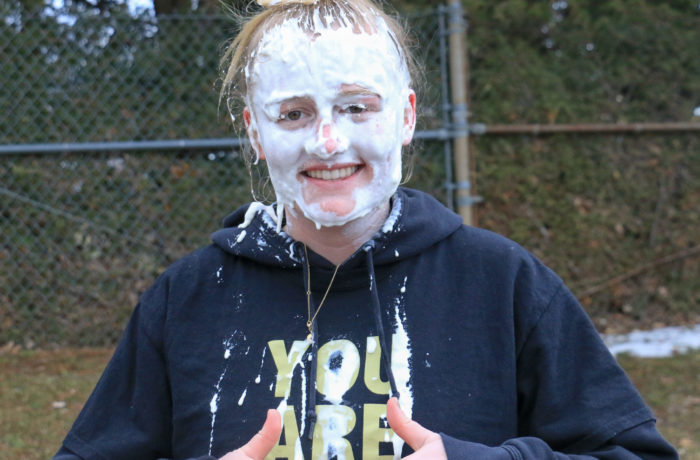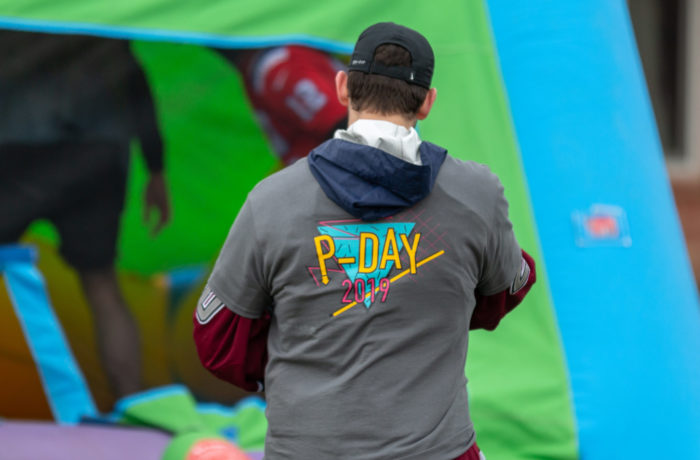 Photo By: Maggie Nevens
Photo By: Maggie Nevens
By Stephen Higgins
Staff Writer
The stench of beer and marijuana fill the campus as the weekend comes back around, greeting the students ready to forget about work both in and out of the classroom for a few hours. With a couple beers tucked under the belt or in their pockets, underclassmen stumble down the quad residence hallways trying to act calm and collected as they make their way from pregame to party.
Strobe lights and roused crowds mark the party towards which everyone heads. Rattling with excitement, the townhouses fill as people clog the doorway squeezing through like sheep into their pen. In the sea of inebriated students, friends shout to each other over the chorus of the song blasting through the house. As the night night turns into morning, people clumsily walk back to bed or towards Einstein’s, scavenging for something to settle the alcohol in their system.
Many students assume this is what every weekend is like at St. Michael’s College, but within the mass of intoxicated people are students who have chosen not to drink, and back in the dorms many others have decided to stay in for the night and entertain themselves with something other than alcohol.
“It’s easy to make friends when you get drunk together, but it’s much harder when you have to have real conversations” said Jasmine Powell ’18, recalling her biggest concern as she entered her freshman year. Powell said she was nervous about making friends in a social scene that she believed revolved around drinking. She attempted to surround herself with people who found themselves in a similar predicament by living in GREAT housing; a dry, alcohol-free building on campus. However, she soon realized that she fit in more with the people who enjoyed partying each weekend. Uncompromising on her commitment to stay sober, she decided to join on her own terms. “I was really sure to tell people the first or second time that I met them that I’m sober and I don’t drink. That set me up for success,” Powell said. “People care a lot less whether you drink or not.”
Binge-drinking has become a much-discussed topic surrounding colleges and universities across the country. However, the actual significance of this culture on the St. Michael’s campus is not as drastic as many may believe. Earlier this year, students were asked to complete a survey based on their habits and behaviors with alcohol. The survey concluded that in the past 30 days, 77.6 percent of students had consumed alcohol. This goes against the perception that 96.2 of students had used alcohol as recently.
Like many students, Powell’s freshman year was not without its social struggles. Being a level-headed participant each weekend came with a burden of its own. She remembered the many times her freshman-year-friends would drink too much knowing she would always be there to put them to bed and take care of them.
Now in her last semester, Powell has gone to parties almost every weekend and her friends understand and respect these boundaries. “By the time we’re seniors people have gotten more of a handle on drinking than they did freshman year,” Powell said, adding that her roommates know how to control themselves while drinking. “If they do get out of control, they know that I’m not going to sit over the toilet and hold their hair all night. I’m straight up about that because that just ruins my night,” Powell said.
As her time immersed in the college culture comes to a close she reflects on how her experience has been shaped by the college’s tight-knit community. “Going to a small school helps a lot. Most people know that I don’t drink. People aren’t weird or pushy if they ask me if I want a drink and I say no. I’ve never gotten into a situation where someone’s being really aggressive about me not drinking. I don’t feel judged for it,” said Powell.
Perception can have a big impact on students and what they choose to do. It was perceived that only 2.5 percent of the undergraduate population had never had alcohol, while the actual number was 13.6 percent, as observed by the survey. “There are students who may drink beyond control. There are many more students that don’t.” said Lou DiMasi, the dean of students and director of student life. DiMasi emphasized that staff members, resident assistants in particular, attempt to provide ample alternatives to drinking for those who choose to abstain from it. “It all comes down to students making sure that they’re making good decisions for themselves,” DiMasi said.
The survey also revealed discrepancies about volumes of alcohol consumed. 44.3 percent of students reported having four or fewer drinks the last time they partied, while 30.7 percent said they had seven or more.
“It’s overestimated in how pervasive it is,” said Doug Babcock, the director of public safety. As the campus security force, public safety faces the challenge of giving students personal space, while not allowing absolute freedom with no restrictions. The dilemma is heavily strained by alcohol use each weekend.
“The more responsibility the students take, the less we do. The perfect night for us is when we get no calls. Put me out of business,” Babcock said.
As perception differs from reality as it relates to the statistics, perhaps experience is the most effective way to explore the campus culture surrounding alcohol use. Rachel High ‘20, who has chosen not to drink, said she is fully engaged with the party culture on weekends. “I have a lot of experience being surrounded by drunk people so personally I don’t feel uncomfortable [at parties],” High said. “I just try to remind myself that the vast majority of people I’m surrounded by are drunk and they are not cognizant enough to observe what I’m doing so why should I be embarrassed? It’s the spotlight effect.” High said she made the choice not to drink before her studies began and intends to stay alcohol-free after college.
“People that want to party definitely make the effort and whether or not there are parties to go to they’re still going to get really drunk,” High said.
Powell echoed the sentiment. “It’s more low-key than major universities, but it still has the similar aspects of any college drinking culture where people drink to get drunk.”


